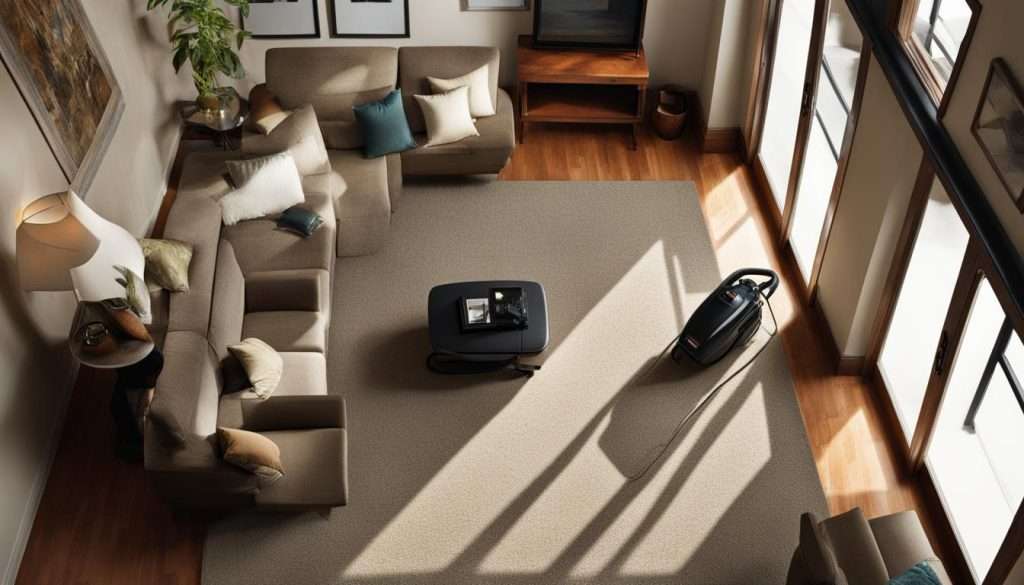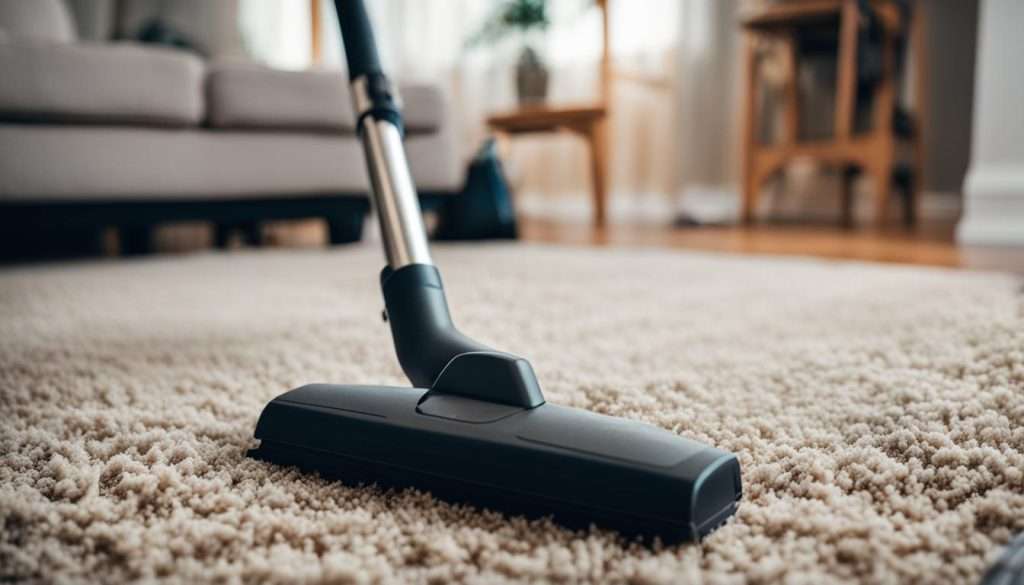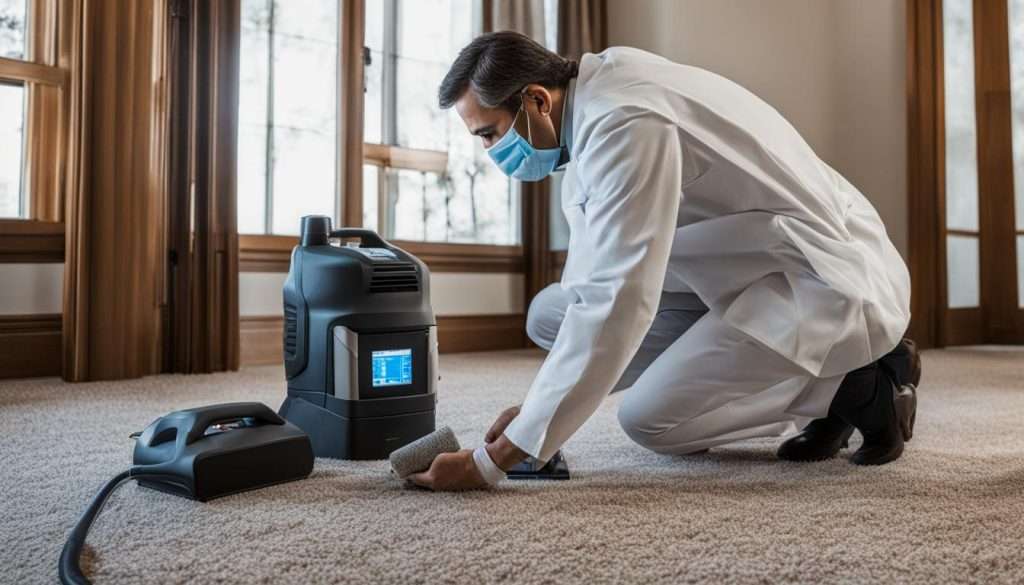Regular carpet cleaning is essential for maintaining a healthy indoor environment for individuals suffering from allergies. Here are some tips for allergy-friendly carpet cleaning supported by Asthma & Allergy UK:
Key Takeaways:
- Carpet cleaning is crucial for reducing allergens and creating cleaner homes.
- Asthma & Allergy UK approves specific carpet cleaning techniques for allergy sufferers.
- Vacuuming high-traffic areas regularly using a HEPA filter helps remove dirt and allergens.
- Deep cleaning carpets with steam at least twice a year effectively eliminates deep-seated dirt and allergens.
- Using allergen-reducing products enhances the effectiveness of regular carpet cleaning routines.
The Importance of Carpet Cleaning for Allergies
Carpets play a significant role in our homes, providing comfort and warmth. However, they can also harbor allergens that worsen allergy symptoms. Regular carpet cleaning is essential for creating an allergen-free environment and reducing allergy symptoms. By maintaining clean carpets, you can improve indoor air quality and ensure a healthy indoor environment for individuals with allergies, especially those with asthma or respiratory conditions.
One of the main reasons why carpet cleaning is crucial for allergies is that carpets act as magnets for allergens like pollen, pet dander, dust, and mold. These allergens can accumulate in the carpet fibers and become airborne when disturbed, causing allergic reactions. Regular cleaning removes these allergens from the carpet, preventing their recirculation in the air and reducing exposure.
In addition to improving indoor air quality, regular carpet cleaning also helps maintain a healthy indoor environment by preventing the accumulation of allergens. Allergy sufferers spend a significant amount of time indoors, so it is essential to create a safe and comfortable space for them. By investing in allergy-friendly carpet cleaning practices, you can minimize the risk of triggering allergy symptoms and create a healthier living environment.
Vacuuming Tips for Allergy-Friendly Carpet Cleaning
Frequent vacuuming is an integral part of maintaining an allergy-friendly environment in your home. By removing dirt and allergens from your carpets, you can significantly reduce the risk of triggering allergy symptoms. Here are some essential vacuuming tips:
1. Vacuum High-Traffic Areas Regularly
High-traffic areas, such as entryways and living rooms, tend to accumulate more dirt, dust, and allergens. Make sure to vacuum these areas at least once a week to prevent the buildup of allergenic particles.
2. Use a Vacuum Cleaner with a HEPA Filter
A vacuum cleaner equipped with a High-Efficiency Particulate Air (HEPA) filter is highly recommended for allergy-friendly carpet cleaning. HEPA filters can effectively trap tiny particles, including allergens, and prevent their recirculation in the air, ensuring cleaner indoor air quality.
3. Optimize Suction Power and Brushing Mechanism
Choose a vacuum cleaner with maximum suction power to effectively remove dirt and allergens embedded deep within the carpet fibers. Additionally, look for a vacuum cleaner that has a rotating brush or beater bar. This mechanism agitates the carpet fibers, dislodging potential allergens and allowing for more thorough cleaning.
4. Empty the Dustbin or Replace the Bag Regularly
To maintain maximum suction power and ensure efficient cleaning, it is crucial to regularly empty the vacuum’s dustbin or replace the bag. A full dustbin or bag can restrict airflow and reduce the vacuum’s effectiveness in removing dirt and allergens from your carpets.
By incorporating these vacuuming tips into your regular cleaning routine, you can create a healthier and allergy-friendly environment for you and your family.
| Vacuuming Tips for Allergy-Friendly Carpet Cleaning |
|---|
| 1. Vacuum High-Traffic Areas Regularly |
| High-traffic areas, such as entryways and living rooms, tend to accumulate more dirt, dust, and allergens. Make sure to vacuum these areas at least once a week to prevent the buildup of allergenic particles. |
| 2. Use a Vacuum Cleaner with a HEPA Filter |
| A vacuum cleaner equipped with a High-Efficiency Particulate Air (HEPA) filter is highly recommended for allergy-friendly carpet cleaning. HEPA filters can effectively trap tiny particles, including allergens, and prevent their recirculation in the air, ensuring cleaner indoor air quality. |
| 3. Optimize Suction Power and Brushing Mechanism |
| Choose a vacuum cleaner with maximum suction power to effectively remove dirt and allergens embedded deep within the carpet fibers. Additionally, look for a vacuum cleaner that has a rotating brush or beater bar. This mechanism agitates the carpet fibers, dislodging potential allergens and allowing for more thorough cleaning. |
| 4. Empty the Dustbin or Replace the Bag Regularly |
| To maintain maximum suction power and ensure efficient cleaning, it is crucial to regularly empty the vacuum’s dustbin or replace the bag. A full dustbin or bag can restrict airflow and reduce the vacuum’s effectiveness in removing dirt and allergens from your carpets. |
The Benefits of Deep Cleaning for Allergy-Friendly Carpets
Allergy-friendly carpet cleaning goes beyond regular vacuuming and surface cleaning. Deep cleaning is an essential step to effectively remove deep-seated dirt and allergens from carpets, creating a healthier indoor environment for individuals with allergies.
The Power of Steam Cleaning
Steam cleaning is a highly effective method for deep cleaning carpets and eliminating allergens. It involves the use of hot water and eco-friendly cleaning solutions to break down dirt, dust, and allergen particles embedded in the carpet fibers. The steam cleaner’s high temperature and powerful suction effectively remove these contaminants, leaving your carpets fresh, clean, and allergen-free.
Hiring Professional Carpet Cleaning Services
To ensure a thorough and effective deep clean, it’s recommended to hire professional carpet cleaning services. These experts have the knowledge, experience, and specialized equipment to tackle deep-seated dirt and allergens effectively. They use eco-friendly and hypoallergenic cleaning solutions that are safe for allergy sufferers. By entrusting your carpets to professionals, you can be confident in the quality of the cleaning and enjoy the benefits of a cleaner, healthier indoor environment.
Achieving Allergy-Friendly Results
Deep cleaning your carpets with steam and utilizing professional carpet cleaning services not only removes visible dirt but also addresses the hidden allergens that can trigger allergies. By reducing allergen levels in your carpets, you can create an environment that is safer and more comfortable for individuals with allergies. Regular deep cleaning, combined with other allergy-friendly cleaning practices, is key to maintaining an allergen-free home.
| Benefits of Deep Cleaning for Allergy-Friendly Carpets |
|---|
| Effective removal of deep-seated dirt and allergens |
| Creates a healthier indoor environment for individuals with allergies |
| Utilizes the power of steam cleaning to eliminate allergens |
| Professional carpet cleaning services ensure thorough and safe cleaning |
By incorporating deep cleaning into your carpet maintenance routine, you can significantly reduce allergen levels and provide a cleaner, safer environment for allergy sufferers. Consult with professional carpet cleaning services to ensure your carpets receive the deep cleaning they need, using eco-friendly and hypoallergenic solutions. With regular deep cleaning, you can enjoy the benefits of allergy-friendly carpets and improve the overall air quality in your home.
Allergen-Reducing Strategies for Carpet Cleaning
Allergen-reducing strategies can significantly improve the effectiveness of allergy-friendly carpet cleaning practices. By incorporating specially designed products into your regular cleaning routine, you can facilitate the removal of allergens from your carpets and reduce exposure to potential triggers. Two popular options for allergen reduction are allergen-reducing carpet powders and allergen-reducing sprays.
Allergen-reducing carpet powders are formulated to bind with allergens and make them easier to vacuum up during the cleaning process. These powders are applied to the carpet, left for a specific time as directed, and then vacuumed thoroughly to remove both the powder and the trapped allergens. This process helps to reduce the presence of allergens in your carpets and promotes a healthier indoor environment.
Similarly, allergen-reducing sprays work by neutralizing allergens on the carpet surface, making them less likely to become airborne and more easily removable during vacuuming. These sprays can be applied directly to the carpet and left to dry before vacuuming. By using these sprays regularly, you can enhance the effectiveness of your cleaning routine and minimize allergen exposure in your home.
| Allergen-Reducing Strategies | Benefits |
|---|---|
| Allergen-Reducing Carpet Powders | Bind with allergens for easy removal during vacuuming |
| Allergen-Reducing Sprays | Neutralize allergens on carpet surface for improved removal |
When using allergen-reducing products, it’s important to follow the instructions provided by the manufacturer for optimal results. Additionally, remember to maintain a regular cleaning routine to ensure the ongoing reduction of allergens in your carpets. By combining these allergen-reducing strategies with other allergy-friendly carpet cleaning techniques, you can create a cleaner and healthier living environment for you and your family.
Maintaining a Healthy Indoor Environment
To create a healthy indoor environment for individuals with allergies, it is important to implement certain measures that control humidity, minimize allergen exposure, and promote overall cleanliness. These strategies can significantly reduce the presence of allergens in the home and improve the well-being of allergy sufferers.
Control Humidity
Maintaining optimal humidity levels in the home is crucial for allergy-friendly environments. Dust mites, a common indoor allergen, thrive in high humidity environments. To control humidity, use a dehumidifier in areas prone to moisture, such as basements or bathrooms. Additionally, ensure proper ventilation by using exhaust fans in kitchens and bathrooms to reduce moisture buildup. Monitoring and controlling humidity levels between 30% and 50% can help deter dust mites and create a less favorable environment for allergens.
Allergen-Proof Covers
Using allergen-proof covers on pillows and mattresses can provide an additional layer of protection against allergens. These covers are specially designed to prevent allergens, such as dust mites, pet dander, and pollen, from penetrating the surface. By creating a barrier between the individual and the allergens, allergen-proof covers help reduce exposure while sleeping and contribute to a healthier indoor environment.
Ventilation and Pet Care
Proper ventilation plays a crucial role in reducing indoor allergen levels. When weather permits, open windows to allow fresh air to circulate throughout the home. This not only helps remove allergens but also improves indoor air quality. Additionally, regular pet care is essential for allergy-friendly environments. Grooming pets regularly and washing their bedding and toys helps minimize the spread of pet dander, a common allergen. By implementing these measures, individuals with allergies can create a healthier and more comfortable living space.
| Control Humidity | Allergen-Proof Covers | Ventilation and Pet Care |
|---|---|---|
| Monitor and control humidity levels between 30% and 50% to deter dust mites | Use allergen-proof covers on pillows and mattresses to prevent allergen penetration | Proper ventilation by opening windows when weather permits |
| Use dehumidifiers in areas prone to moisture, such as basements and bathrooms | Create a barrier against allergens while sleeping | Regularly groom pets and wash their bedding and toys |
| Control moisture buildup by using exhaust fans in kitchens and bathrooms | Reduce exposure to pet dander, a common allergen |
Seeking Professional Guidance for Allergies
For individuals with severe allergies, it is highly recommended to seek professional guidance from an allergist or immunologist. These highly trained medical professionals specialize in diagnosing and treating allergies, providing personalized guidance and specific measures to manage your symptoms effectively.
Professional allergists and immunologists have the expertise to identify your specific triggers through thorough allergy testing. They can then tailor a treatment plan based on your unique needs, which may include medication, allergy shots, or lifestyle modifications. By working closely with a professional, you can gain a deeper understanding of your allergies and receive the most appropriate and effective care.
When dealing with severe allergies, it is essential to have access to personalized guidance that takes into account your specific allergy profile. Professional allergists and immunologists can provide you with comprehensive and up-to-date information about your allergies, helping you navigate potential allergen exposures and reduce your risk of severe reactions. They can also offer valuable advice on creating an allergy-friendly environment in your home, such as removing or minimizing allergens and implementing preventive measures.
Why Consult a Professional Allergist or Immunologist?
Professional allergists and immunologists are trained to diagnose and treat a wide range of allergies, including severe allergies. They have in-depth knowledge of the latest research, treatment options, and best practices in allergy management. By consulting with an expert, you can ensure that you receive accurate information and guidance based on the most current scientific evidence.
Moreover, professional allergists and immunologists can provide ongoing support and monitoring, helping you manage your allergies effectively in the long term. They can track your progress, make adjustments to your treatment plan as needed, and provide you with the tools and resources necessary to live a fulfilling life while managing your allergies.
Summary:
For individuals with severe allergies, seeking professional guidance from an allergist or immunologist is recommended. These professionals can provide personalized guidance on managing allergies and recommend specific measures for the home environment. Consulting a professional can greatly contribute to effectively addressing allergies and creating a safer and healthier living space.
The Benefits of Natural Fibers for Allergy-Friendly Carpets
When it comes to creating an allergy-friendly environment, choosing the right carpet is essential. Natural fiber carpets, such as wool, offer numerous benefits that make them an excellent choice for individuals with allergies. Not only are they hypoallergenic, but they also have stain-resistant and durable properties.
One of the key advantages of natural fiber carpets is their hypoallergenic nature. Wool, in particular, is known for trapping allergens, reducing their presence in the indoor environment. This helps to minimize allergic reactions and create a cleaner and healthier living space. By opting for a natural fiber carpet, allergy sufferers can enjoy a home that is more comfortable and free from potential triggers.
In addition to their hypoallergenic qualities, natural fiber carpets are also stain-resistant and durable. Wool carpets, for example, have natural oils that prevent stains from penetrating deep into the fibers, making them easier to clean and maintain. Moreover, natural fibers are inherently durable, ensuring that the carpet will withstand daily wear and tear, providing long-lasting reliability.
The Benefits of Natural Fiber Carpets
To summarize, the benefits of natural fiber carpets for allergy-friendly environments are:
| Benefit | Description |
|---|---|
| Hypoallergenic | Natural fibers like wool trap allergens, reducing allergic reactions. |
| Stain-Resistant | Natural oils in the fibers prevent stains from penetrating deep into the carpet. |
| Durable | Natural fibers are inherently strong and can withstand daily wear and tear. |
Overall, choosing a natural fiber carpet, such as wool, offers a range of benefits for allergy sufferers. These carpets provide a hypoallergenic and cleaner indoor environment while also being resistant to stains and durable enough to withstand regular use. By investing in a natural fiber carpet, individuals with allergies can create a space that promotes better health and well-being.
Choosing Low-VOC Carpets for Allergy-Friendly Environments
When creating an allergy-friendly environment, opting for low-VOC (volatile organic compounds) carpets is essential. Low-VOC carpets are made using low-VOC fibers, glues, and backing materials, ensuring they are safe for individuals with allergies. These carpets are particularly beneficial for those with asthma or respiratory disorders, as they reduce the release of harmful chemicals into the air.
Not only are low-VOC carpets safe for allergy sufferers, but they can also be treated with antimicrobial properties. This antimicrobial treatment helps to inhibit the growth of bacteria, mold, and mildew, creating a cleaner and healthier indoor space. By choosing low-VOC carpets with antimicrobial properties, you can further enhance the allergy-friendliness of your environment.
Additionally, it is crucial to use low-VOC carpet cleaning products when maintaining your carpets. Traditional carpet cleaning products often contain chemicals that can trigger allergies and respiratory issues. Opting for low-VOC carpet cleaning products not only ensures the safety of allergy sufferers but also contributes to a more eco-friendly and sustainable approach to carpet cleaning.
Overall, choosing low-VOC carpets for allergy-friendly environments is a wise decision. These carpets are safe for allergy sufferers, offer antimicrobial properties, and can be cleaned using low-VOC products. By prioritizing low-VOC materials and cleaning methods, you can create a truly safe and healthy space for those affected by allergies.



